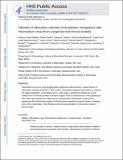Infection of laboratory colonies of Anopheles mosquitoes with Plasmodium vivax from cryopreserved clinical isolates
Author(s)
Shaw-Saliba, Kathryn; Clarke, David; Santos, Jorge M; Menezes, Maria José; Lim, Caeul; Mascarenhas, Anjali; Chery, Laura; Gomes, Edwin; March, Sandra; Bhatia, Sangeeta N; Rathod, Pradipsinh K; Ferreira, Marcelo U; Catteruccia, Flaminia; Duraisingh, Manoj T; ... Show more Show less
DownloadAccepted version (689.4Kb)
Terms of use
Metadata
Show full item recordAbstract
© 2016 Australian Society for Parasitology Plasmodium vivax is the most geographically widespread malaria parasite. Unique features of transmission biology complicate P. vivax control. Interventions targeting transmission are required for malaria eradication. In the absence of an in vitro culture, transmission studies rely on live isolates from non-human primates or endemic regions. Here, we demonstrate P. vivax gametocytes from both India and Brazil are stable during cryopreservation. Importantly, cryopreserved gametocytes from Brazil were capable of infecting three anopheline mosquito species in feedings done in the United States. These findings create new opportunities for transmission studies in diverse locales.
Date issued
2016Department
Harvard University--MIT Division of Health Sciences and TechnologyJournal
International Journal for Parasitology
Publisher
Elsevier BV
Citation
Shaw-Saliba, K., et al. "Infection of Laboratory Colonies of Anopheles Mosquitoes with Plasmodium Vivax from Cryopreserved Clinical Isolates." Int J Parasitol (2016).
Version: Author's final manuscript